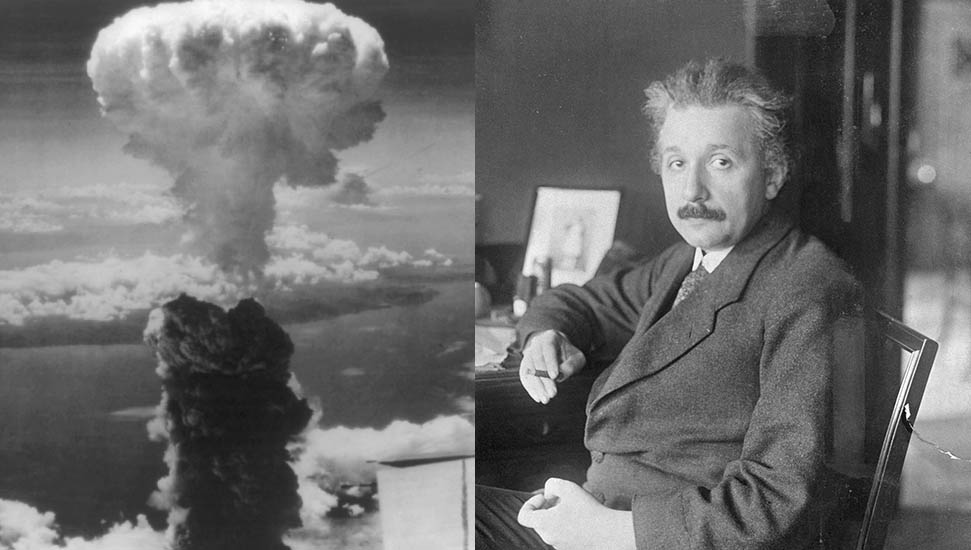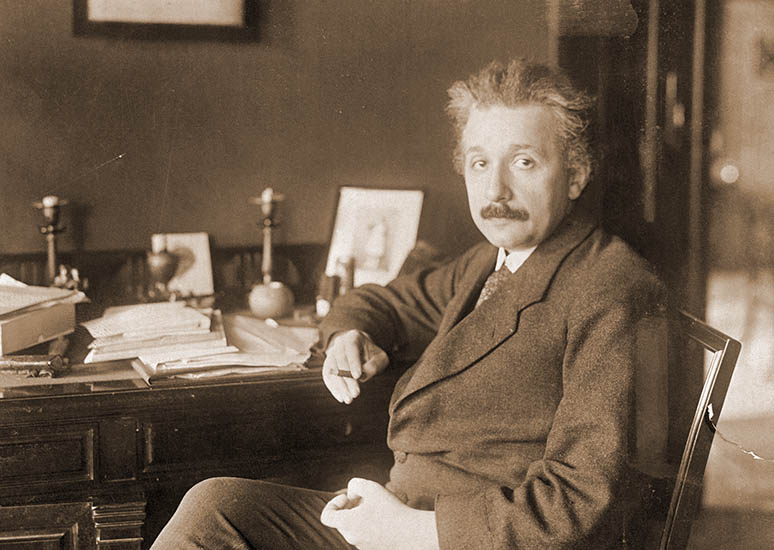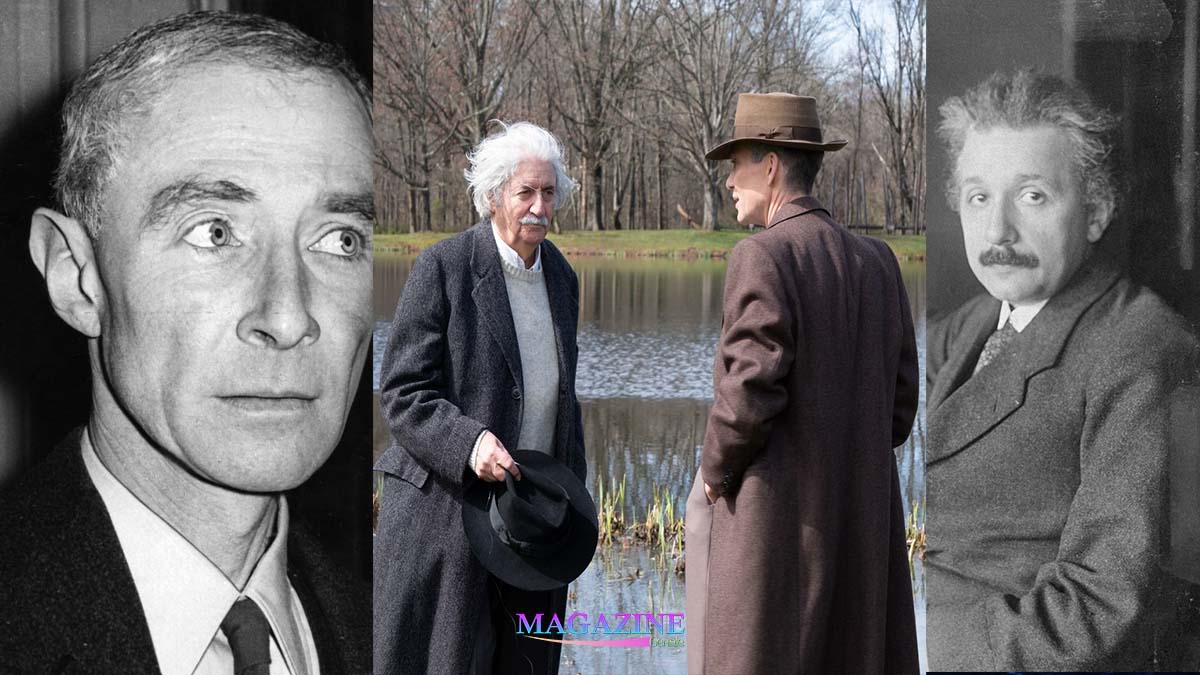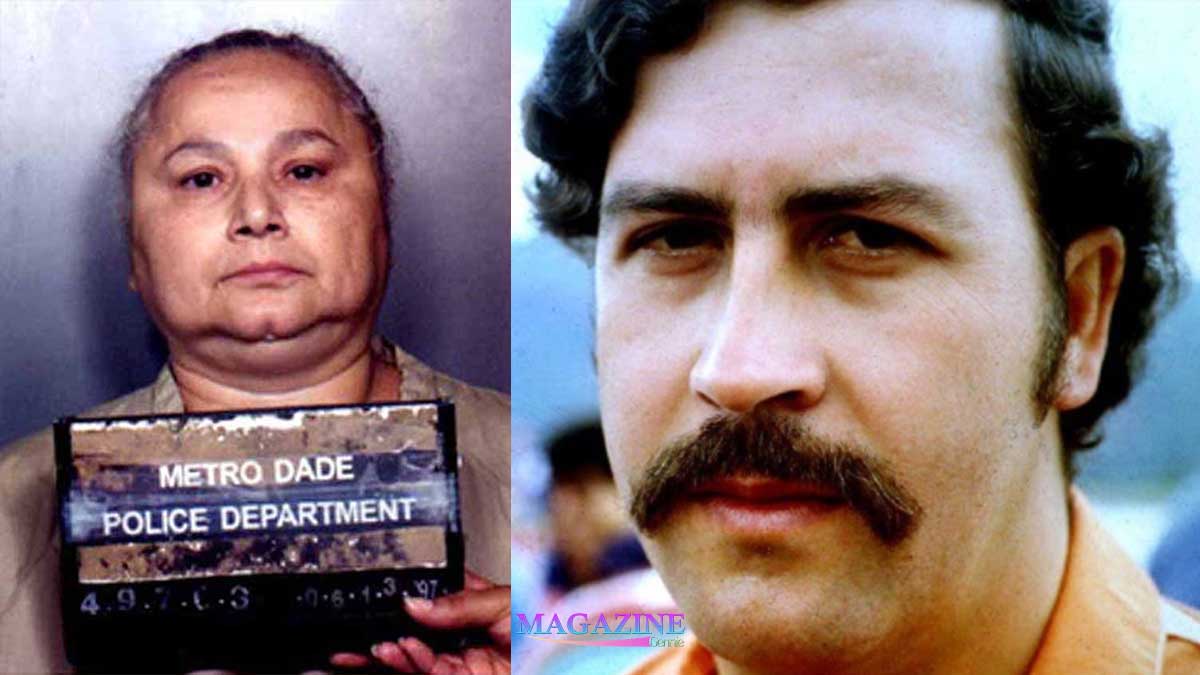The specific words spoken between Einstein and Oppenheimer depend on whether you’re referring to historical reality or the movie “Oppenheimer”. Here’s a breakdown of both:
In reality:
There is no record of any specific, noteworthy conversation between Einstein and Oppenheimer about the atomic bomb. While they did know each other and exchanged letters occasionally, their views on the weapon differed. Einstein opposed its development and use, while Oppenheimer, though initially hesitant, ultimately played a key role in the Manhattan Project.
Table of Contents
In the movie “Oppenheimer”:
The film creates a fictionalized exchange between the two during Oppenheimer’s struggle with guilt and responsibility after the bomb’s creation. Here’s the key dialogue:
- Oppenheimer asks Einstein if he remembers a past conversation where they considered the possibility of the bomb’s chain reaction triggering the destruction of the entire universe.
- Einstein replies, “I remember it well. What of it?”
- Oppenheimer says, “I believe we did,” implying fear that their actions have unleashed destructive forces beyond control.
This exchange in the movie is not based on historical facts but serves as a powerful symbolic moment exploring the characters’ inner conflict and the potential consequences of scientific advancements.
See also : What did Pablo Escobar say about Griselda Blanco?
Why was Einstein afraid of the atomic bomb?

Albert Einstein was afraid of the atomic bomb due to his pacifist beliefs and the catastrophic potential of its use. He deeply regretted his role in the bomb’s development and expressed that “Had I known that the Germans would not succeed in developing an atomic bomb, I would have done nothing for the bomb”.
Despite urging the U.S. to develop the atomic bomb out of fear that Nazi Germany was working on similar weapons, he later condemned the use of the bomb against Japan and expressed concerns about the unparalleled catastrophe and dreadful danger posed by atomic experiments. Einstein’s fear stemmed from his pacifist principles and the devastating impact he foresaw the atomic bomb could have on humanity.
Einstein’s fear of the atomic bomb stemmed from several factors, including:
1. Its destructive potential: Einstein understood the immense power inherent in nuclear fission, potentially capable of wiping out entire cities and causing widespread devastation. He worried about the human cost and the consequences for global peace and stability.
2. Misuse of scientific knowledge: As a scientist who dedicated his life to understanding the universe, Einstein deeply valued using knowledge for good. He feared that the atomic bomb could fall into the wrong hands and be used for malicious purposes, leading to uncontrollable destruction.
3. The arms race: He envisioned a terrifying chain reaction where nations developed and stockpiled atomic weapons, escalating tensions and increasing the risk of accidental or intentional detonation. This could lead to a devastating arms race and the potential annihilation of humanity.
4. Lack of international control: He believed that effective international control and regulations were crucial to prevent the proliferation of nuclear weapons and minimize the risk of their use. He saw a lack of such control as a critical gap that could lead to disaster.
5. His personal responsibility: Although he did not directly work on the Manhattan Project, Einstein’s earlier letter to President Roosevelt urging research on nuclear reactions contributed indirectly to the bomb’s development. He later expressed regret for his involvement and dedicated his efforts to advocating for nuclear disarmament and peace.
In conclusion, Einstein’s fear of the atomic bomb was complex and multifaceted. It stemmed from a deep understanding of its destructive power, combined with concerns about its misuse, potential for an arms race, lack of control, and a sense of personal responsibility. He became a vocal advocate for peace and disarmament, hoping to prevent the horrors he envisioned from coming true.
Does Einstein regret the bomb?

While we cannot definitively know what thoughts and emotions went through Einstein’s mind, historical evidence suggests he deeply regretted his involvement in the development of the atomic bomb. Here’s why:
1. Public Statements:
- In a 1947 Newsweek interview, he stated, “Had I known that the Germans would not succeed in producing an atomic bomb, I would never have lifted a finger.” This implies regret for his initial involvement in urging research due to fears of a Nazi bomb.
- He actively campaigned for nuclear disarmament and international control of atomic weapons throughout his later life, suggesting strong opposition to the weapon’s existence and use.
2. Letters and Writings:
- Einstein expressed concerns about the bomb’s destructive potential and the arms race it might trigger in private letters and public statements.
- He called for international cooperation and regulations to prevent its proliferation and use for catastrophic purposes.
3. Actions and Associations:
- Einstein joined and supported organizations advocating for peace and nuclear disarmament, demonstrating his active opposition to the atomic bomb and its implications.
4. Indirect Involvement:
- While not directly involved in the Manhattan Project, his initial letter to President Roosevelt urging research into nuclear energy did contribute indirectly to the bomb’s development. This likely added to his sense of responsibility and potential regret.
5. Pacifist Beliefs:
- Throughout his life, Einstein held strong pacifist beliefs and a deep disdain for war and violence. The immense destructive potential of the atomic bomb directly contradicted these values, fueling his regret and opposition.
Overall, although we cannot definitively claim “regret” as an emotion, the historical evidence strongly suggests that Einstein deeply opposed the atomic bomb and wished he had not been involved in its development. His efforts to prevent further proliferation and advocate for peace after the war further solidify his stance.




